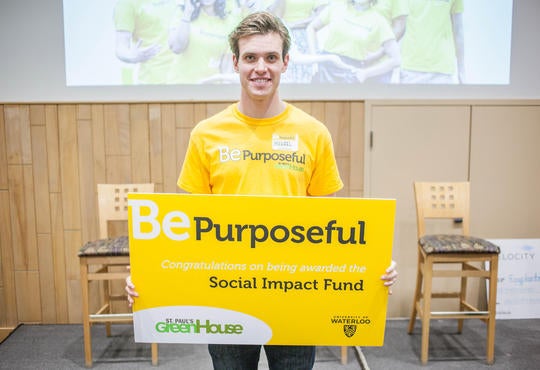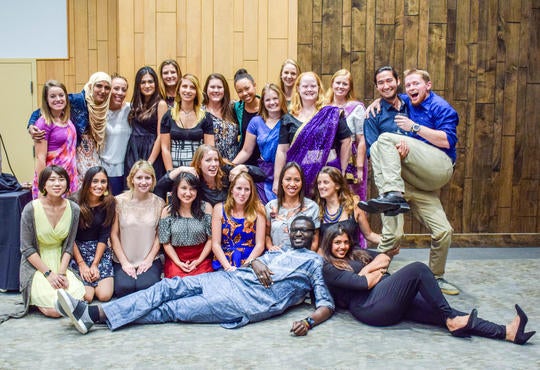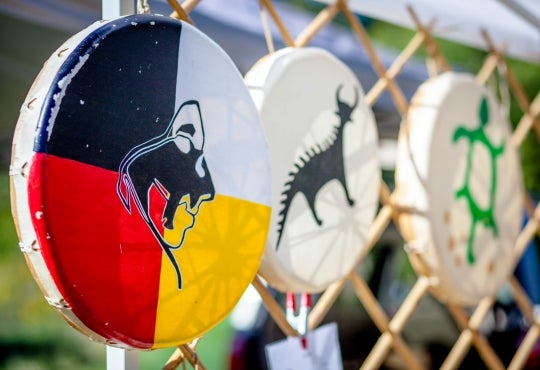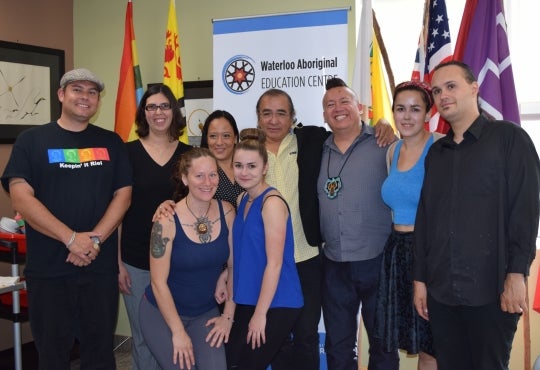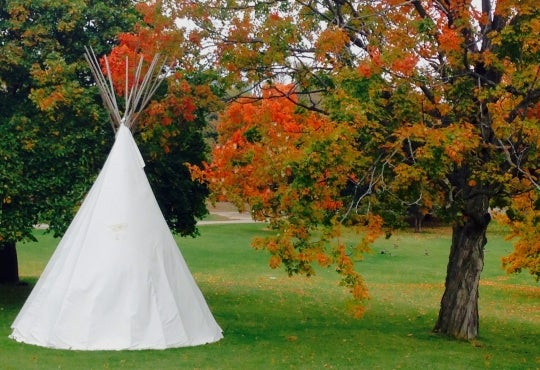An interview with the new Director of the Waterloo Aboriginal Education Centre, Lori Campbell
Q: What are three things you think the St. Paul’s community should know about you?
A: My identity is situated at the intersection of my existence as a Two-Spirited Āpihtākosisāniskwēw (Mētis woman) of mixed Nēhiyaw (Cree) and Scottish heritage. I am super optimistic and believe that when we know better we can’t help but want to do better. I studied music when I was younger and attained my grade 8 piano with the Royal Conservatory of Music and Grade 2 theory.
Q: What inspired you to move from Saskatchewan and take this position at St. Paul’s/Waterloo?
A: I spent the first 17 years of my life learning about who I was from a family, community, and education system that had no idea. The misinformation – and absence of information – about the history of Indigenous peoples caused me to internalize a negative sense of identity. But when I showed up at University, I hit the jackpot! At the Saskatchewan Indian Federated College, I met many strong and intelligent Indigenous professors and administrators. I learned who I was from people who knew exactly who I was, where I came from, and why I was feeling so lost. As I was developing a positive sense of cultural continuity, I was becoming a successful post-secondary student. Cultural continuity is foundational to becoming a healthy being and it can be extremely difficult, if not impossible, to achieve a higher education if students are in an unhealthy way.
My life experiences contribute both to my understanding of Indigenous realities and to my passion for education. I believe that educational institutions can be places where Indigenous students, staff and faculty, alongside their non-Indigenous counterparts can thrive, co-exist, and develop a strong sense of cultural continuity alongside one another. Multiple realities, ways of knowing, and knowledge systems can be reflected. With the 94 calls to action of the Truth and Reconciliation report, I believe we know better. My passion to help facilitate this process within the post-secondary sector is what motivated me to take this position here at St. Paul’s/Waterloo.
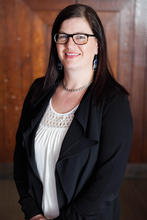
Q: What do you want the St. Paul’s community to know about the University’s response to the Truth and Reconciliation Commission’s 94 calls to action?
A: In addition to the 94 Calls to Action, the University of Waterloo, as a member of Universities Canada, has agreed to follow Universities Canada principles on Indigenous education: http://www.univcan.ca/. While the principles and calls to action are relevant to all post-secondary institutions, how they are followed and incorporated is to be determined by each unique institution and, quite possibly, individual Faculties. UWaterloo is in the process of putting together a high-level task force to ensure that an appropriate Indigenization strategy is put in place that meets the needs of this particular University. I am optimistic that the larger University community will start receiving some high-level direction and support over the next academic year to ensure that we are answering the appropriate calls to action in the best way possible.
Q: Some Canadians might think these issues do not concern them personally, that it is being handled by governments. What would you like those people to know about their role in reconciliation?
A: We live in a democracy. We elect the government with hope that they will lead us to be more prosperous, healthy, and successful as a nation and, in turn, the government requires its people to be the change that they are working towards creating. It is clear that we were all – Indigenous and non-Indigenous peoples – systematically denied the opportunity to learn about Indigenous history in pre-Canada and Canada. Today, I don’t believe any Canadian can, in good conscious, say that they do not know better now.
Reconciliation requires letting go of any guilt or denial. Reconciliation requires acknowledging that Indigenous peoples are the original residents and caretakers of the land. It requires acknowledgement and understanding that many government policies contribute to present-day social and economic issues that Indigenous people face today. Reconciliation means that recognizing past injustices is essential to building a better future for all people of this nation and for the generations to come. Now that we know better, let’s do better.
Q: How can alumni and friends support your work in the Waterloo Aboriginal Education Centre?
A: I am new to this territory. I come from the numbered treaties out west. What I do know about all of the treaties, though is that everyone is a party to the treaties. Everything about the treaties belongs to all of us. It is no different than acknowledging that everything about the Canadian Constitution belongs to all of us. I have been learning about the Two Row Wampum Treaty that was agreed upon in this territory. I understand that the three non-negotiable key terms for honouring the agreement are trust, friendship, and mutual respect. That is what I offer and what I ask to be offered in return. Asking questions in this way and choosing to be accountable for our own learning supports us in successfully moving forward alongside one another and each mutually benefiting from our ongoing relationship.
If you'd like to reach Lori, contact her at lori.campbell@uwaterloo.ca
Indigenizing the campus
After the publication of the report of the Truth and Reconciliation Committee, Universities Canada committed all Canadian universities to indigenize as part of a national process of reconciliation. The University of Waterloo will be developing an indigenization strategy for the broader campus. As the host of the WAEC, however, St. Paul’s has a special mission in this area, and that mission confers a responsibility to be especially pro-active with respect to Indigenization.
With guidance from the Indigenous Advisory Circle, Principal Myers and Lori Campbell have launched consultations with members of the St. Paul’s community to gather input on the following questions:
What can we do to make the College more welcoming to Indigenous people?
What measures might we take to improve understanding among non-Indigenous students and staff of “the realities, histories, cultures and beliefs of Indigenous people in Canada”?
How might we promote greater intercultural understanding?
If you wish to provide feedback on any of these questions, please send your responses to Rick Myers by email: stp.principal@uwaterloo.ca
Special guests on Campus
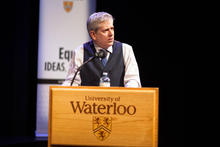 The Waterloo Aboriginal Education Centre hosted Charlie Angus, MP for Timmins-James Bay, for a dialogue session in February. Mr. Angus is the author of seven books, including the award-winning Children of the Broken Treaty, and has actively fought for equal rights for First Nations children. In particular, Angus is an advocate for equitable funding for on-reserve education, playing an active role in the youth-driven movement known as “Shannen’s Dream,” which helped build a new school for the children of Attawapiskat.
The Waterloo Aboriginal Education Centre hosted Charlie Angus, MP for Timmins-James Bay, for a dialogue session in February. Mr. Angus is the author of seven books, including the award-winning Children of the Broken Treaty, and has actively fought for equal rights for First Nations children. In particular, Angus is an advocate for equitable funding for on-reserve education, playing an active role in the youth-driven movement known as “Shannen’s Dream,” which helped build a new school for the children of Attawapiskat.
***
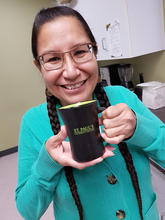 The Indigenous Speakers Series, a collaboration between WAEC and the Faculty of Arts, hosted Sylvia McAdam (Saysewahum), a global grassroots Indigenous activist recognized for co-founding the Idle No More movement. McAdam gave a talk about her book Nationhood Interrupted: Revitalizing nêhiyaw Legal Systems.
The Indigenous Speakers Series, a collaboration between WAEC and the Faculty of Arts, hosted Sylvia McAdam (Saysewahum), a global grassroots Indigenous activist recognized for co-founding the Idle No More movement. McAdam gave a talk about her book Nationhood Interrupted: Revitalizing nêhiyaw Legal Systems.
WAEC receives Equity and Inclusivity Award
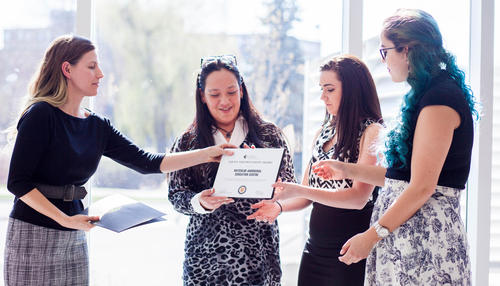
If you’ve ever been to an event at the Waterloo Aboriginal Education Centre (WAEC), you might have a pretty good idea of why the University’s Status of Women and Equity Committee (SWEC) awarded the Centre with the 2017 Equity and Inclusivity Award.
While the Centre is first and foremost a supportive and safe space for Indigenous students, it also manages to engage non-Indigenous students, staff, and faculty in the sharing of Indigenous knowledge, and has been especially successful in forming collaborative partnerships with other community organizations.
WAEC activities include everything from outreach educational programs with Indigenous communities, lectures and events, an annual Pow Wow, and – to those on campus – Soup and Bannock lunches every week during the Fall and Winter.
The Equity and Inclusivity Award is a celebration of members of our community whose actions have demonstrated an exemplary commitment to improving equity, inclusivity, and/or diversity at the University of Waterloo,” said Kate Rybczynski, Chair of SWEC. “It takes a community to bring about change, and the WAEC exemplifies this community by bringing people together.”
WAEC Director Lori Campbell said, “It is truly an honour for WAEC staff and students to be recognized for sharing their cultures, lived experiences, and knowledges with the greater University of Waterloo campus and surrounding community. This is not always an easy task as the Indigenous contemporary reality is born of our collective intergenerational histories.
She added, “We look forward to even larger scale engagement as we collectively navigate towards addressing the Calls to Action as set for by the Truth and Reconciliation Commission.”
At the presentation ceremony held April 18, Waterloo President Feridun Hamdullahpur stressed, “We cannot talk about excellence at the University without also talking about excellence for everybody.”
One of the Centre’s students, Emma Smith, who accepted the award with fellow students Amy Smoke and Shelby Keedwell, noted that, “To students, the Centre is more than just a space – it’s a home.”
There are 135 self-identified Indigenous students at the University of Waterloo.



